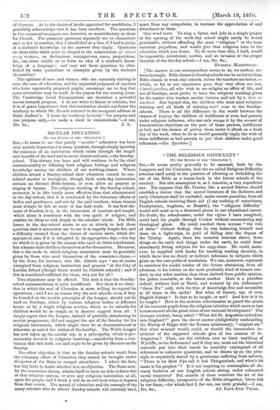"THE RELIGIOUS DIFFICULTY."
(TO THE EDITOR OF TAB SPECTATOR.") Sin,—It seems pretty generally to be assumed, both by the Leaguers and the Unionists, that the so-called Religious Difficulty attaches itself solely to the question of allowing or forbidding the use of the Bible as a lesson-book in the future schools of the country. But this assumption is, as I conceive, a very superficial one. For suppose that Mr. Forster, like a second Darius, should establish a decree that the sacred literature of the Hebrews and early Christians shall be excluded, under severe penalties, from all English schools receiving State aid (I say nothing of catechisms, Presbyterian, Anglican, or Romish), the "religious difficulty' would still meet us in a thousand places in our educational career. Nodoubt, the schoolmaster, under the regime I have imagined,. could lead his pupils through Cocker without encountering any theological ghost. He could conduct them acrcoss "the rule- of three" without feeling that he was balancing himself and them on a tight-rope, in peril of falling into the dogma of the Trinity. Again, from the material heavens above, from. things on the earth and things under the earth, he could draw abundantly fitting subjects for his copy-lines. He could, more- over, be supplied with books for teaching reading decently, in which there was no direct or indirect reference to subjects which grate on the ears polite of secularists. We can, moreover, represent to ourselves the model master of the future abstaining from all allusions, in his tuition on the most profitable kind of human con- duct, to any other motives than those derived from public opinion, the police constable, or the labour market. Here is a paradise indeed, without God or Devil, and watered by the Alderman's "three R's" only, with the tree of knowledge free and accessible at all times in the midst ! But what of history, say, of even English history ? Is that to be taught, or not? And how is it t& be taught? How is the anxious schoolmaster to guard the minds of his innocent pupils from the religious infection which more or less hovers around all the great crises of our national development ? The German student, being asked "What did St. Augustine introduce into England ?" gave the clever answer (delightfully confounding the Bishop of Hippo with the Roman missionary), "original sin." But what account would, could, or should the immaculate in- structor of the supposed schools give of the mission of St. Augustine ? Then, are the children ever to learn anything of Wycliffe, or the Reformers? and if they are, must not the historical manuals put into their hands be carefully expurgated of all references to unknown quantities, and be drawn up on the prin- ciple so exquisitely stated by a gentleman suffering from aphasia, "There is no How d'ye call it but Thingumbob, and what's his name is his prophet" ? Is it not inspiring to contemplate all the many beehives of our English schools sitting under exhausted moral receivers ? But outside of these receivers the air of the religious difficulty, irrespective of the Bible altogether, blows full in our faces,—for which fact I, for one, am truly grateful.—I am,








































 Previous page
Previous page